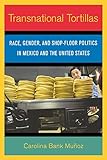Transnational Tortillas : Race, Gender, and Shop-Floor Politics in Mexico and the United States / Carolina Bank Muñoz.
Material type: TextPublisher: Ithaca, NY : Cornell University Press, [2011]Copyright date: ©2011Description: 1 online resource (216 p.) : 2 tables, 1 chart/graphContent type:
TextPublisher: Ithaca, NY : Cornell University Press, [2011]Copyright date: ©2011Description: 1 online resource (216 p.) : 2 tables, 1 chart/graphContent type: - 9780801474224
- 9780801460425
- Factory system -- California
- Factory system -- Mexico -- Baja California (Peninsula)
- Foreign workers, Mexican -- California
- Industrial relations -- California
- Industrial relations -- Mexico -- Baja California (Peninsula)
- Tortilla industry -- California
- Tortilla industry -- Mexico -- Baja California (Peninsula)
- Women -- Employment -- Mexico -- Baja California (Peninsula)
- Labor History
- Latin American & Caribbean Studies
- Political Science & Political History
- SOCIAL SCIENCE / Emigration & Immigration
- 338.4/7664752
- HD9330.T753 M612 2008
- online - DeGruyter
- Issued also in print.
| Item type | Current library | Call number | URL | Status | Notes | Barcode | |
|---|---|---|---|---|---|---|---|
 eBook
eBook
|
Biblioteca "Angelicum" Pont. Univ. S.Tommaso d'Aquino Nuvola online | online - DeGruyter (Browse shelf(Opens below)) | Online access | Not for loan (Accesso limitato) | Accesso per gli utenti autorizzati / Access for authorized users | (dgr)9780801460425 |
Frontmatter -- Contents -- Acknowledgments -- 1. The Tortilla Behemoth and Global Production -- 2. The Political Economy of Corn and Tortillas -- 3. A Tale of Two Countries: Immigration Policy and Globalization in the United States and Mexico -- 4. Hacienda CA: Immigration Regime -- 5. Hacienda BC: Gender Regime -- 6. Fighting Back? Resistance in the Age of Neoliberalism -- 7. Shop-Floor Politics in the Twenty-First Century -- Notes -- References -- Index
restricted access online access with authorization star
http://purl.org/coar/access_right/c_16ec
This book looks at the flip side of globalization: How does a company from the Global South behave differently when it also produces in the Global North? A Mexican tortilla company, "Tortimundo," has two production facilities within a hundred miles of each other, but on different sides of the U.S.-Mexico border. The workers at the two factories produce the same product with the same technology, but have significantly different work realities. This "global factory" gives Carolina Bank Muñoz an ideal opportunity to reveal how management regimes and company policy on each side of the border apply different strategies to exploit their respective workforces' vulnerabilities.The author's in-depth ethnographic fieldwork shows that the U.S. factory is characterized by an "immigration regime" and the Mexican factory by a "gender regime." In the California factory, managers use state policy and laws related to immigration status to pit documented and undocumented workers against each other. Undocumented workers are subject to harsher punishment, night-shift work, and lower pay. In the Baja California factory, managers sexually harass women-who make up most of the workforce-and create divisions between light- and dark-skinned women, forcing them to compete for managerial attention, which they understand equates with job security. In describing and analyzing the differences in working conditions between the two plants, Bank Muñoz provides important new insights into how, in a globalized economy, managerial strategies for labor control are determined by the interaction of state policies and labor market conditions with race, gender, and class at the point of production.
Issued also in print.
Mode of access: Internet via World Wide Web.
In English.
Description based on online resource; title from PDF title page (publisher's Web site, viewed 02. Mrz 2022)


